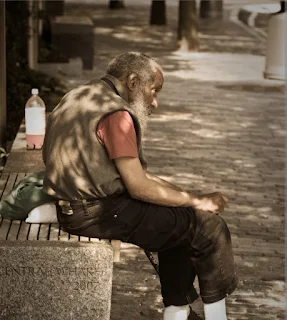"Why Our Programs Will Never Stop Homelessness"
What if we are totally wrong about WHY there are so many people "experiencing" homelessness?
We continue to pour money into a service-based model for dealing with homelessness. Hand out food, because they lack food. Hand out clothes, because they lack money to buy clothes. Hand out tents because they lack the ability to find shelter.
Rehousing programs abound and millions of dollars flood in to get "these people" off the streets.
However, the number of chronically homeless people keeps rising. [Chronically homeless as defined here is distinctly separate from those facing temporary lack of housing due to job loss, sudden eviction, etc.]
Despite our greatest efforts, the problem gets worse. But, what if we are trying to fix the wrong problem?
People do not remain chronically homeless because of an inability to find housing or work. If highly motivated, a person could take advantage of the many programs and pull themselves up from the trenches and back on their feet.
The motivation to rehabilitate is what is missing. So, what motivates them to remain homeless?
Acceptance.
"We humans have a primitive, neurologically wired psychological need to feel valued and included within our primary groups (such as work, friends, and family of origin)." (1)
This is the reason Facebook and Instagram are so wildly popular. We get a thumbs up, a comment, a share, and suddenly we feel accepted, A part of the group.
Those who remain chronically homeless have banded together and formed a tribe. They create whole villages, encampments, and cities. They have found acceptance. Belonging. It's what we all crave most.
They are not going to give this up for anything.
This need is completely ignored in our service programs. In fact, though well-meaning, these programs further separate "them" from "us."
Once physical requirements for life are met, such as food, water, and protection from the elements (i.e. clothing, blankets, tents, or a home), the need for acceptance will drive us as our primary motivation.
While we feel good handing them a dollar, or donating a blanket or a meal, this sends the message that "they" are not like us and need "our" help or worse yet, pity. We send the message that they are not a contributing member of society. Essentially, "What you have to offer isn't good enough, now here is a dollar and some free housing so we don't have to see you out here."
Our service-based model has unintentionally created a bigger divide between regular society and the new communities formed among the homeless.
As long as we keep giving the message that they are incapable of being productive members of society, that they need our help or deserve to be pitied, we are only further cementing the need for them to find acceptance within their own tribes.
The question shouldn't be what can we offer them to fix homelessness, The question is, how can we bring them back into our tribe?
By fulfilling the next basic human need- to be a useful productive member of society, where their contributions are appreciated and needed.
To fix homelessness, they don't need us. We need to need them.
Author Rochelle Love Elder, Civil and Human Rights Advocate
Eugene, OR United States
1. https://abbymedcalf.com/how-to-deal-with-a-defensive-person-who-wont-listen-2/


Comments
Post a Comment
Leave me a comment and share